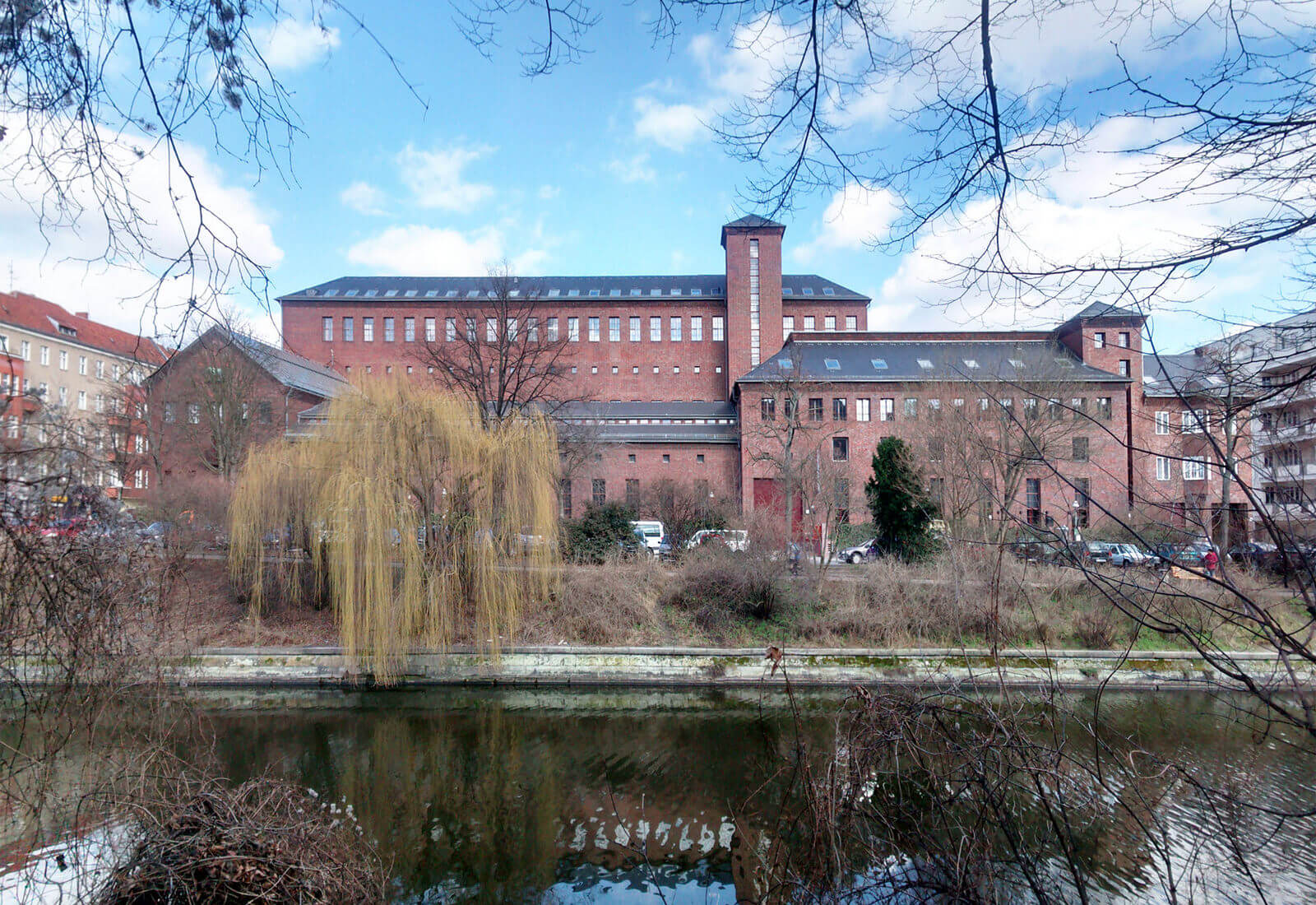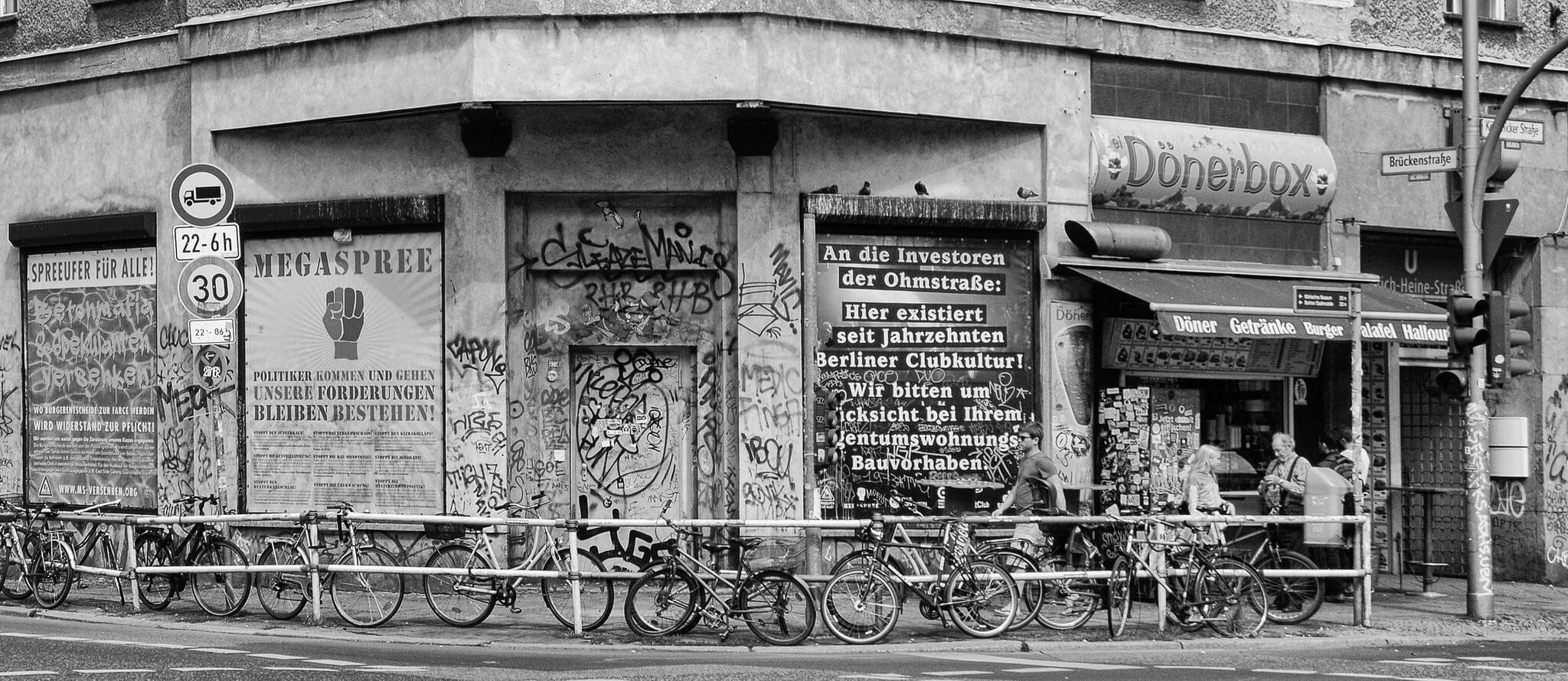“Google means gentrification. When they come, the rents will go up.” An elderly voice comes from the center of a crowded room. “We have to bring back our future and build something for ourselves.” The woman next to him, also of advanced age, adds: “There are already mobilisations organized for other issues, like against Amazon. We need to bring together the protests against Google with these initiatives that are already underway.” A paper is going round among the other attendees of this meeting where people are writing suggestions for protest slogans: “Dismantle Google, live in real time!”, “Google Campus never, defend anarchy!”
Around 50 people are gathering to share information and ideas, to try and find ways to avoid the opening of a new Google Campus in an old factory in Kreuzberg, one of the neighbourhoods hit hardest by the dizzying price rises that are endemic in the German capital.
The omnipresent North American company will arrive in the city with the approval of the local government – the social democrats in coalition with Die Linke and the Greens – whose mayor, Michael Müller, described the announcement as “a good day for Berlin.”
Google’s initial plan was to open its new space and installations by the end of 2017, although the date has been postponed to “mid-2018”, according to a spokesperson from the company. With this in mind, part of the Umspannwerk (an old electric plant located on the banks of one of the Spree river channels) has already been rented to set up a ‘Campus’ for startups. The idea is that entrepreneurs can work and learn there, in addition to getting in touch with the company’s vast network of digital businesses spread throughout the world.

A desirable neighbourhood
Google sees Kreuzberg as its natural habitat. The old working-class neighbourhood, inhabited largely by people of Turkish origin, is now a fashionable area, attractive to young cosmopolitan lovers of electronic music and second-hand clothes, of café latte and Bio products. Yet at the same time Kreuzberg remains a meeting point of the left in Berlin, where several civil associations organize their activities. Activists believe that the opening of the Google Campus would tilt the political and social balance of the neighbourhood in favour of the first group.
“When Google arrives, many things will happen. They’ll drive out the stores, because the Google employees and the people in the startup sector do not need the ones that are here at the moment,” explains Stefan Klein, from the neighbourhood organization GloReiche. “And the landlords, the owners, will take advantage of the arrival of workers with more money to implement new plans for high-end stores, expensive housing …”
Alongside the anarchist bookstore Kalabal!K, GloReiche is the organization that has been most involved in the protest against the arrival of Google, as for Klein “there is nothing positive” that the residents can benefit from. “Kreuzberg is not an appropriate place for Google. They should go to the Adlershof technology park (outside Berlin), where there are other companies like eBay,” he adds.
From the multinational’s point of view, of course, things appear differently, and they are not considering settling in any place other than the electric plant. “We want to be good neighbours in Kreuzberg. All we ask to the local community is to be open and learn more about the Campus and its concept” explained Ralf Bremer, spokesperson for Google in Berlin, via email to El Salto. “We also live here, we understand the concerns and we know how Kreuzberg has developed over the past few years. But, to clarify, we have only rented a part of the Umspannwerk and no more than 10 people from Google will work there.”
In August, the company organized an ‘open doors’ day with the intention of strengthening ties with the local community. At the event, which was invitation only, there was food from a refugee cooking group. This is the message that the company wants to convey: that they are committed to society and that it is only a group of activists that has misinterpreted the Kreuzberg Campus. “We have started a fruitful dialogue with the neighbours, the owners of local shops and NGOs, and that will continue in the coming months” explained the spokesperson.
“We have no contact with them” says Stefan Klein, from GloReiche, “they invited us, yes, but you have to put that invitation in parentheses. They told us that everything has been a misunderstanding, that we thought they were going to bring their headquarters to Berlin but that it is not, that it is only a Google Campus. We knew this already, and they treated us as if we were stupid,” he insists. “When the day came, we went there and there were security guards and a police car in the corner. They are afraid of us! Is that a good way to invite your neighbours? No, it’s not. This is why it’s not the first time I’ve said that they act like colonizers coming to talk to the natives.”

An old story that’s only getting worse
The case of Google is just one more example of the rapid process of gentrification in Berlin. Due to its particular and turbulent history, the urban planning of the city has always been different to that of other European capitals. The large number of abandoned spaces inherited from the Cold War frontier enabled the occupation of buildings and the formation of an alternative culture. Today there is little left of that city, and the process of transformation reached formerly humble neighbourhoods like Kreuzberg years ago.
In February 2013, for example, two blocks down from where the activists are meeting to oppose the Google Campus, an immense police operation carried out the eviction of the Gülbol family, who refused to pay increased rent on their house, in a case that has become a symbol of the gentrification of the neighbourhood.
Four years later, the process is getting worse, according to Susanne, from the Lause Bleibt organization, who was also present at the meeting. “I have lived here for 30 years, and I have seen firsthand the great change that Kreuzberg has suffered, especially among the migrant community. In schools I’ve heard children say that they are afraid of being forced to leave the neighbourhood. This is what they hear from their parents at home.”
All of the activists I spoke to agree that more and more people are coming to their meetings, which, in the words of Stefan Klein, increases interest in gentrification because it is “a problem that affects everyone.” Sometimes their actions force the owners to renegotiate the rise of rents or the closure of local businesses, as happened recently with a cafeteria-bakery called Filou on Reichenberger Street.
The activists are aware of how little they can do against Google, one of the most powerful companies in the world, but they do hope that the local opposition will convince the company managers that Kreuzberg is not a place for them. Will most of the residents join the protest? “Last Thursday’s meeting was just the first one. Now we are contacting international groups to prepare protests,” explains Klein. “I think that when the whole neighbourhood is informed of what the arrival of Google entails, yes, everyone will join. We will see. If not, at least, we will have faced up them.”
* This piece was first published on El Salto. It was translated from Spanish by Marta Cillero.
** Lead image: some human/Flickr. Some rights reserved
![Political Critique [DISCONTINUED]](http://politicalcritique.org/wp-content/uploads/2015/09/Political-Critique-LOGO.png)
![Political Critique [DISCONTINUED]](http://politicalcritique.org/wp-content/uploads/2015/09/Political-Critique-LOGO-2.png)
Adlershof is not outside of Berlin. It is easily reachable and perfect for companies like google.